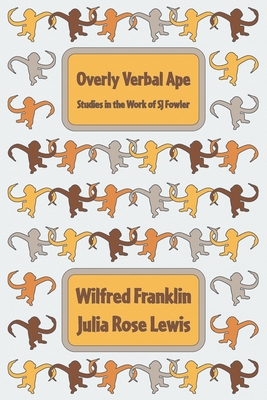Overly Verbal Ape: Studies in the Work of SJ Fowler

Overly Verbal Ape: Studies in the Work of SJ Fowler
Fowler has emerged as a force in the world of experimental poetry and his work deserves serious critical engagement; therefore, The authors utilize The Great Apes as an entry into his larger body of work. He is so prolific because his work as an artist, collaborator, organizer, teacher, and writer provide fuel for his other practices. He has drawn international attention, and yet, there is very little critical engagement with his work beside the writing of David Spittle. Overly Verbal Apes is intended to provide the first of many more responses to Fowler's work.
The authors' personal and professional knowledge of Fowler are complementary. Franklin has only encountered the Fowler through his published work and recorded performances. Lewis has known him since 2015 through classes, events, and publications; she considers him a close friend. She has attended many of his events in person and spoken to him about his performances on the same night. The authors have found that their differing relationships to Fowler give a more rigorous approach to our writing about his development as a writer and the evolution of his work. His prolific output as a writer is evidence of him experimenting in new forms in order to develop his craft. He is restless to relentlessly interested in the evolution of literature: the unrolling of literary kinds, the unfolding of literary kinships, and unrolling the limitations of poetry.
Overly Verbal Ape is an interdisciplinary response to The Great Apes by SJ Fowler, where the authors find themselves simultaneously interested in the evolution of literature and the literature of evolution. They utilize their respective expertise Lewis as poet and Franklin as biologist exploring Fowler's satirical anthropomorphism. The Great Apes is part analogy, part metaphor, part satire, and part translation of biology into poetry; therefore, it cannot be fully appreciated without a discussion that includes both fields. The critics' creative and critical response takes the form of a collection of seven essays, each focusing on a poem or a performance of a poem. They explore Fowler's use of satirical anthropomorphism to craft a criticism of anthropology, biology, and Ecopoetics. Julia Rose Lewis and Wilfred Franklin believe that an interdisciplinary literature requires an interdisciplinary critical response.
PRP: 99.20 Lei
Acesta este Prețul Recomandat de Producător. Prețul de vânzare al produsului este afișat mai jos.
89.28Lei
89.28Lei
99.20 LeiLivrare in 2-4 saptamani
Descrierea produsului
Fowler has emerged as a force in the world of experimental poetry and his work deserves serious critical engagement; therefore, The authors utilize The Great Apes as an entry into his larger body of work. He is so prolific because his work as an artist, collaborator, organizer, teacher, and writer provide fuel for his other practices. He has drawn international attention, and yet, there is very little critical engagement with his work beside the writing of David Spittle. Overly Verbal Apes is intended to provide the first of many more responses to Fowler's work.
The authors' personal and professional knowledge of Fowler are complementary. Franklin has only encountered the Fowler through his published work and recorded performances. Lewis has known him since 2015 through classes, events, and publications; she considers him a close friend. She has attended many of his events in person and spoken to him about his performances on the same night. The authors have found that their differing relationships to Fowler give a more rigorous approach to our writing about his development as a writer and the evolution of his work. His prolific output as a writer is evidence of him experimenting in new forms in order to develop his craft. He is restless to relentlessly interested in the evolution of literature: the unrolling of literary kinds, the unfolding of literary kinships, and unrolling the limitations of poetry.
Overly Verbal Ape is an interdisciplinary response to The Great Apes by SJ Fowler, where the authors find themselves simultaneously interested in the evolution of literature and the literature of evolution. They utilize their respective expertise Lewis as poet and Franklin as biologist exploring Fowler's satirical anthropomorphism. The Great Apes is part analogy, part metaphor, part satire, and part translation of biology into poetry; therefore, it cannot be fully appreciated without a discussion that includes both fields. The critics' creative and critical response takes the form of a collection of seven essays, each focusing on a poem or a performance of a poem. They explore Fowler's use of satirical anthropomorphism to craft a criticism of anthropology, biology, and Ecopoetics. Julia Rose Lewis and Wilfred Franklin believe that an interdisciplinary literature requires an interdisciplinary critical response.
Detaliile produsului










